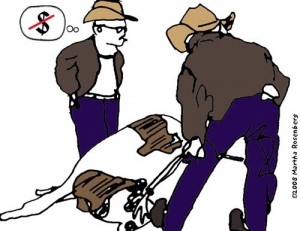It was yet another triumph of cheap meat over animal suffering. A week after the USDA closed Central Valley Meat Co. of Hanford, CA for egregious treatment of sick and dying dairy cows, the facility has reopened under pressure from lawmakers.
The alleged violations–cows thrashing after repeated shots in the head; one apparently suffocated; cows unable to stand, some with udders so swollen they couldn’t keep their legs under them–do not “compromise” food safety and do not merit a “disastrous” work stoppage, said three California Republicans representing the agricultural Central Valley, Majority Whip Kevin McCarthy and Reps. Devin Nunes and Jeff Denham.
Not only is the animal suffering defensible because it creates “jobs,” the week-long shutdown of Central Valley Meat Co. depressed beef prices and added to the economic hardship on farmers in the region, said the lawmakers in getting the USDA to reverse its decision. Why should farmers be penalized just because they sold animals who couldn’t walk and who had been milked until they were “half dead”–a characterization from animal expert Temple Grandin upon viewing the Central Valley Meat Co. video?
Besides, if the dying downer cows were so abused, why didn’t the two full-time USDA inspectors intervene, asked the California lawmakers?
Are the lawmakers unaware of the congressional testimony of the late USDA veterinarian Dean Wyatt, who described how federal meat inspectors have been demoted into powerless figureheads, openly laughed at by plant managers in the US’s increasingly privatized slaughterhouse industry? And similar testimony from USDA meat inspector Lester Friedlander who describes the overwhelming pressure to never stop the production line, for humane or hygiene reasons?
No wonder the Los Angeles Times wrote, “The U.S. Department of Agriculture has 7,800 pairs of eyes scrutinizing 6,200 slaughterhouses and food processors across the nation. But in the end, it took an undercover operation by an animal rights group to reveal that beef from ill and abused cattle had entered the human food supply,” when similar abuse was filmed at the Westland/Hallmark Meat Company in Chino, CA in 2008, a supplier of the National School Lunch Program.
Rather than shutting down Central Valley Meat Co. like it did Westland/Hallmark, the USDA caved to California lawmakers and chose to keep it open so dairy farmers have a place to unload the pathetic, spent animals who have been worked within an inch of their death. Let’ s hear it for cheap meat!
But Central Valley Meat Co. has not gotten off scot-free. On a quarterly basis, employees will be trained in humane handling. No more electric prodding animals who can’t stand or walk! No more shooting animals in the face repeatedly even though they don’t die. No more standing on the animal’s mouth until it smothers! Got that, employees?
Not everyone thinks the retraining will work. “One glaring gap in this list is a provision for punishment of workers who violate these rules or humane slaughter laws,” writes Piper Hoffman. “Another is the assumption that humane stunning is always possible. Captive bolt guns, which slaughterhouse workers shoot into cows’ heads to stun them before slaughter, are notoriously unreliable.”
Still, Central Valley Meat has said it is “thankful” for the reprieve and that it looks forward to “getting back to work and continuing to help feed America.”
California lawmakers, who asked federal authorities to show “compassion” to the slaughterhouse and its workers, were also grateful. “The video was posted by extremists who are actively working to undermine production agriculture in the United States,” they wrote federal authorities.
Many would say it is Central Valley Meat that is undermining production agriculture.











